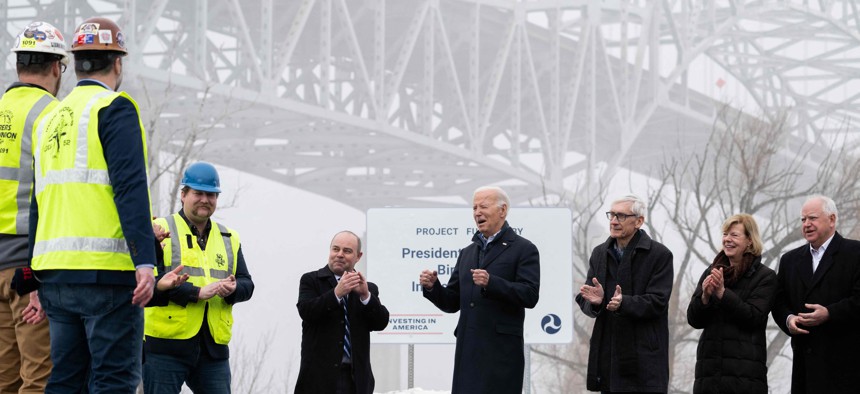Biden unveils $4.9B in big-ticket infrastructure grants

President Joe Biden (C) visits the John A. Blatnik Memorial Bridge in Superior, Wisconsin on Thursday, along with Wisconsin Gov. Tony Evers and Minnesota Gov. Tim Walz and other officials. Saul Loeb/AFP via Getty Images
Three dozen projects got the green light and millions of federal dollars. The president also used the announcement to bolster his reelection campaign.
An effort to replace an aging bridge connecting Minnesota and Wisconsin received $1 billion from the Biden administration Thursday, as federal transportation officials announced major grants to three dozen big-ticket infrastructure projects across the country.
Other major winning projects include the Cross Bronx Expressway in New York City, the replacement of an interstate bridge between Oregon and Washington state, the rehabilitation of I-70 across Missouri, the building of a new railroad bridge for Brightline trains in Florida and a massive expansion of on-dock rail loading at the Port of Long Beach, California.
California also got money to build a port to support offshore wind projects. California, Florida, Missouri, Oregon, Pennsylvania, Washington and Wisconsin received grants to improve truck parking. Washington, D.C., will use $34 million to improve safety and access to East Capitol Street by improving pedestrian facilities, bicycle lanes and bus stops. Several other states secured money to widen highways, particularly in mountainous terrain.
The president punctuated the news with a return visit to Superior, Wisconsin, where the John A. Blatnik Memorial Bridge connects to Duluth, Minnesota. Biden visited the 60-year-old bridge in March 2022, on the day after his State of the Union speech, to emphasize the importance of the infrastructure law he signed in the first year of his term. The bridge carries 33,000 vehicles a day, but it is in such poor condition that officials said it would have to be shut down by 2030 if not replaced.
Biden appeared for a photo-op on the snowy shores of Lake Superior near a sign that says, “Project funded by President Joe Biden’s Bipartisan Infrastructure Law.”
“For decades, people talked about replacing this bridge, but it never got done until today,” Biden later told supporters at a nearby brewery. “This investment is going to make a huge difference: less traffic, fewer car accidents, faster commutes to your jobs and schools, quicker response times from fire trucks and first responders when every minute counts. Goods are going to get shipped quicker and commerce will flow more freely.”
Biden said the project would lead to 10,000 construction jobs and called it an example of his administration investing in America.
With Biden running for reelection and Wisconsin a major swing state in the upcoming campaign, the Democratic president pitched the construction projects as having greater significance.
“This bridge is important, but the story we’re writing is much bigger than that,” he said. “When you see the shovels in the ground and the cranes in the sky and people hard at work on these projects, I hope you feel a renewed sense of pride: pride in your community, pride in what we can do, pride in America.”
Bridges bring people together —that’s why we build them. And this bridge has brought us together. Minnesota and Wisconsin. Democrats and Republicans. People who voted for the bridge and people who didn’t. pic.twitter.com/U39oPt7rLN
— Governor Tim Walz (@GovTimWalz) January 25, 2024
Earlier, Transportation Secretary Pete Buttigieg told reporters that the projects announced Thursday would have major impacts.
“We are advancing projects so large, complex and ambitious that they could not get funded under the infrastructure programs that existed prior to the Biden administration,” he said. The grants, Buttigieg continued, “are helping build the cathedrals of American infrastructure: truly transformative projects that will change entire regions and our entire country for the better.”
In all, administration officials handed out 37 awards totaling $4.9 billion through the Infra and Mega grant programs, some of the most prominent and flexible infrastructure grants that federal officials have control over.
As usual, the competition for the federal grants was crowded. The Transportation Department received 117 applications asking for $24.7 billion from the Mega grant program, and another 190 requesting $24.8 billion from the Infra program.
The Mega grants (formally known as National Infrastructure Project Assistance grants) are for major projects that are too big for traditional grant programs. Congress created them when it passed Biden’s signature infrastructure law in 2021. The Infra grants (formally called Infrastructure for Rebuilding America grants) are dedicated to freight and multimodal projects of national significance.
“Even with this historic funding, we were not able to say, ‘yes’ on the first round to a majority of the applicants because we just had so many applications,” Buttigieg said.
“Every project that did succeed is different in some way. But one thing that many of them have in common is that they brought together many benefits at once.”
“Safety is really the top one that we look at,” the former South Bend mayor added. “Many of the most compelling applications combined safety with other benefits including economic strength, job creation and climate benefits. Often there was a benefit in terms of equity because a rural area or a previously underserved area was finally getting the funding that it deserves to. We really see in these big projects, multiple overlapping benefits.”
Buttigieg said federal officials would debrief unsuccessful applicants to let them know how their applications could be stronger in future funding rounds.
Daniel C. Vock is a senior reporter for Route Fifty based in Washington, D.C.
NEXT STORY: Airports are finally back to their pre-pandemic normal, Fitch says






